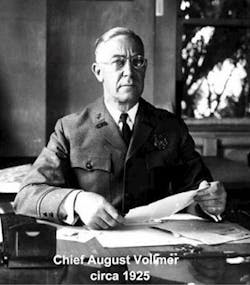Last month we examined a true legend in the law enforcement community. Allan Pinkerton and his legacy have been examined in numerous books and movies and that will probably continue as Hollywood continues its search for new material. This month we're going to have a look at an individual whose legacy is arguably even more important to law enforcement than Pinkerton's. His ideas and procedures have set the standard for many agencies throughout the history of this country. Unless you're a student of history or in law enforcement (or live in Berkeley, California) you've probably never heard of August Vollmer.
August "Gus" Vollmer was born in New Orleans, Louisiana in 1876 to John Vollmer and Philopine Klundt, both German immigrants. Following the death of his father, his mother moved the family back to Germany in 1884. Two years later they relocated to San Francisco, California and in 1891 they moved across the bay to Berkeley. Vollmer's education consisted of grade school supplemented by vocational training in bookkeeping, typing and shorthand (in New Orleans).
With the outbreak of the Spanish-American War, Vollmer enlisted in the Army and served for one year in the Philippines. After returning home he was employed as a letter carrier for four years and was eventually approached to run for the office of town marshal. Vollmer's notoriety was enhanced when he leapt onto a runaway railroad freight car on Shattuck Avenue in downtown Berkeley and applied the brakes. This made him a public hero and in April 1905, at the age of 29, Vollmer won the election 3 to 1.
At the time of his appointment the police department was in shambles. Crime in some areas of Berkeley was so bad that the Southern Pacific transcontinental trains refused to stop at the stations. His belief was that the police force should be run, operationally, like the Army and he set out to do just that. He also made education a top priority among police recruits. Vollmer felt this was critical. "The policeman's job is the highest calling in the world. The men who do that job should be the finest men. They should be the best educated. They should be college graduates. That's what policemen should be. And what are they? Dumbbells."
In 1908 August Vollmer started the Berkeley Police School. The instructors were himself and an Oakland police inspector. Subjects included first aid, photography, and courses in sanitation laws and criminal evidence. The Berkeley Police Department, under the leadership of Chief Vollmer, was at the forefront of Police innovation. These included: the first use of scientific investigation (Kelinschmidt Case - analysis of blood, fibers and soil - 1907), the first Police Motorcycle Patrol (1911), the first School of Criminology at University of California, at Berkeley (1916) and in 1920 the first lie detector instrument was developed at University of California for use by the Berkeley Police Department.
Education was so important to Vollmer that, by 1930, all recruits received 312 hours of class work within police school, including technical police subjects, criminal law and procedure, police psychology, criminal identification, and police organization and administration. Vollmer taught summer sessions at the University between 1916 and 1932; after retirement he was appointed as research professor at Berkeley's political science department. His forward thinking was a model of efficiency and he was hired by the City of Los Angeles and served as their Police Chief from 1921-22. During the early 1930s he reorganized the Kansas City Police Department in an effort to stamp out corruption. He also headed the national Commission on Law Enforcement under President Hoover.
In 1932, with his eyesight failing, Vollmer retired from the Berkeley Police Department. Continuing to teach at the University in 1937 he then founded the American Society of Criminology and 1941 and served as its president. In the early 1950s he contracted cancer of the throat as well as Parkinson's disease. He chose to take his own life at the age of 75 on November 4th, 1955. Even in death Vollmer seemed to do the extraordinary things by donating his body to the University of California and all his books to the Police Department. Such a stellar career in Law Enforcement should be celebrated. He truly was a legend in every sense of the word.

Charles Bennett
Charles Bennett was born in our Nation's Capital and grew up in the Maryland suburbs. Mr. Bennett has been working in all aspects of the publishing industry since the late 1980s primarily in the fields of commercial photography and magazine production. Moving to California in 1992 to attend college resulted in B.F.A and Masters degrees. California also supplied Mr. Bennett with his wife. The two of them are avid sports persons and participate in shooting, scuba diving, surfing, running and bicycling. As a long time hobby Mr. Bennett has studied the legends of American law enforcement which led to his writing these columns.



